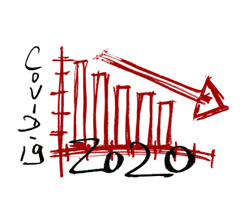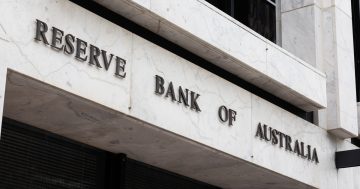Ian Verrender* says the looming economic downturn is different from anything we have ever witnessed.
 If ever you needed convincing that financial markets have become completely divorced from reality, just look at recent events.
If ever you needed convincing that financial markets have become completely divorced from reality, just look at recent events.
Over the course of four days, until Friday, 27 March, Wall Street went on a tear, notching up huge gains which by the end of Thursday’s session put it more than 20 per cent ahead of where it began the week.
Technically, that’s what traders call a bull market, a sign that the economy is returning to strength and company earnings and, hence, share prices are in recovery.
The performance, based on the hope that central banks and government stimulus would insulate financial markets from a global economic downturn, was more BS than bull.
For more than three decades, central bankers have played puppeteer to financial markets, propping them up when things turn ugly.
If the previous week proved anything, it is that they haven’t entirely exhausted all their powers.
But the looming economic downturn, delivered with such speed and ferocity, is different from anything we’ve ever witnessed — one that could reshape society and the way we live our lives.
We have only just entered a recession that is shaping up to be one of the most painful in at least a century as millions of Australians see their jobs evaporate, their lives upended, their savings eroded and their health imperilled.
America dragging the chain
Global leaders either are in outright denial over the scope of the problem the world is facing or are taking an overly optimistic approach.
The longer America takes to bring the health crisis under control, the greater the economic fallout, in terms of both its severity and its longevity.
As the world’s biggest economy and the global reserve currency, the more America is damaged, the greater smaller nations like Australia will be affected.
Deepest recession in a century
Economic crises often begin in the banking sector and slowly work their way through to the real economy.
Not this one.
As a health issue, it began in the streets and has forced the shutdown of many businesses.
Recessions usually involve slowing revenues.
This time, tens of thousands of small, medium and large-scale businesses have found themselves with absolutely no revenue.
Ultimately, that could feed back to the banking sector with potentially worrying effects.
Our banks are in far stronger shape than a decade ago, following a concerted campaign by governments and central banks to force them to bolster their reserves.
Banking is the riskiest business of all, with huge liabilities, skinny profit margins and limited capital.
So, a sharp and prolonged rise in bad debts and mortgage defaults will hurt them, potentially putting the financial system at risk.
That’s why the Federal Government is targeting households for relief and enlisting help from the banks.
This won’t be easy.
If you’d asked Reserve Bank of Australia Governor, Dr Philip Lowe six months ago about his worst nightmare for our economy, there’s a strong chance he would have replied: “A sudden spike in our unemployment rate.”
That nightmare scenario is unfolding.
And it is occurring far more rapidly than anyone could have imagined.
Hundreds of thousands of Australians have suddenly found themselves out of work and unable to pay their way.
With world record levels of household debt — much of it tied up in real estate and mortgages — unemployment equals loan defaults.
That hurts banks.
There’s a negative feedback loop here, too.
Desperate people don’t spend.
That accentuates a downturn, fuelling even more layoffs.
According to investment bank Morgan Stanley, up to two million Australians are exposed to the most affected industries such as tourism, retail and hospitality.
You don’t quickly bounce back from recession, particularly one this severe.
Businesses can be crippled, confidence destroyed and lenders wary.
What’s needed is a vaccine.
More pain for stock markets
One of the key measures announced by Prime Minister, Scott Morrison and Treasurer, Josh Frydenberg was a relaxation of superannuation rules, allowing those in financial distress to access up to $20,000 this year and next year.
It may bolster spending and give the economy a lift.
The only problem with that plan is that it will put further pressure on the stock market because the only way super funds can provide that kind of cash to their members is by selling shares.
In recent years, Industry Funds, which now dominate superannuation, have piled into infrastructure and other alternative investments in a bid to diversify their source of income.
Such investments aren’t easy to sell.
So, to meet the expected cash redemptions, they’ll have to offload liquid investments like stocks and bonds.
Meanwhile, many of our corporations will need to raise more cash from shareholders.
Those that don’t, or can’t, will come under significant pressure, particularly if the recession extends into next year.
But there is a much bigger threat to stock markets globally.
Many big multinationals have taken advantage of ultra-cheap loans and have hocked themselves to the hilt over the past decade.
Mostly, they’ve just handed the money straight back to shareholders.
So, they still owe vast quantities of debt but have nothing to show for it.
Around A$21 trillion of corporate debt globally remains outstanding, much of it raised through corporate bond markets.
Corporate bond prices have collapsed.
Concerns about debt defaults have rocked Wall Street in the past month and contributed to one of the worst credit squeezes in history.
Money managers have been forced to offload anything and everything they can to raise cash, resulting in a huge shortage of money.
That’s why the US Federal Reserve has cut interest rates to zero and embarked on an unprecedented money printing program.
It’s why our own central bank has weighed into money markets, pumping billions into the system.
The world suddenly has become a dangerous place.
Make no mistake, financial markets have further to fall.
* Ian Verrender is the ABC’s Business Editor.
This article first appeared at www.abc.net.au.










